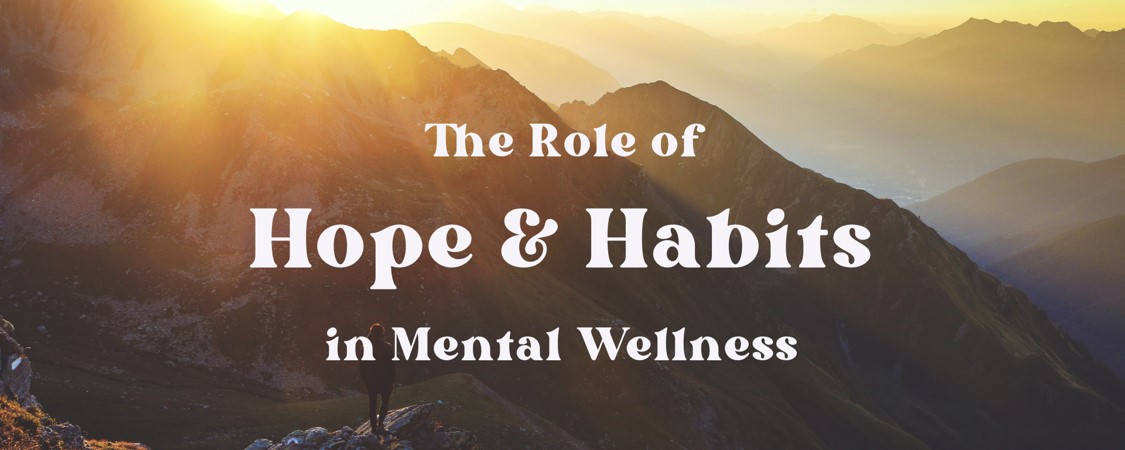The Habit of Finding Hope
- Written by Julie Geeting, LPC

It’s the beginning of 2022 and I see some unwelcome, familiar themes staring us down in what is now our third calendar year in a pandemic. Memes and articles are circulating. The theme is decidedly distant from hope.
A few days after the new year, I was in quarantine, immersing myself in research on hope, fine-tuning a seminar topic our wellness team had chosen way back in the summer of 2021. In the spirit of fully committing to the theme, I also revisited a few of my favorite hopeful films because, well, why not? My schedule had a 2020 kind of roominess to it.
What exactly is hope? Why is it important to mental wellness? With this recent time spent gaining fresh insight, I feel I could be a “hope evangelist,” of sorts. I believe that hope is underestimated, and I would like to be a small part of changing that.
The topic had me reflecting on my own life-changing trials and how I was able to get through them. I also thought about family members and people who had lived through painful periods in history. How did my great uncle endure many months as a prisoner of war? What was it like to be a teen in Europe during World War II? A parent during the Great Depression?
The definitions of hope are rooted in philosophy, psychology, and human development. According to The Oxford Handbook on Hope, hope has three ingredients: positive future expectations; agency, which includes the feeling of control over one’s actions; and trust. Hope is active and tangible, and its influence on our mental health is noteworthy.
In reviewing dozens of studies on hope, there are important themes related to wellness. Higher reports of hope are predictive of greater subjective well-being, overall satisfaction with life, quality of life and mental health quality of life. Hope is associated with better outcomes in treating PTSD and with less anxiety, stress and depression.
Hope is often misunderstood. It is not wishful thinking or toxic positivity. Hope involves realism. It is setting and accomplishing goals that are meaningful. Hope includes letting go of something, often the past, so that you can take steps toward something else. It involves free will, and the flexibility of mind that allows you to change course when your current path isn’t getting you to the place or thing you want to move towards.
So how are hope and habits connected?
Hope helps individuals pursue goals. It is predictive of positive outcomes in many domains of life, including work, relationships, education, and physical and psychological health.
Habits are a recurring pattern of behavior acquired through repetition. In the book “Atomic Habits,” author James Clear notes that they are the small decisions you make and actions you perform each day.
With attention and awareness, habits can become instruments of hope in your life.
Creating intentional habits that are aligned with what matters to you, and who you wish to be, can be a daily investment to build more hope in your life. And you saw the research. Hope is powerful. It is worthy of our energy, one habit at a time.
Hope is also an important theme in many favorite films and novels. Hope speaks to our power to change. Ideas of hope are captivating, capturing our imaginations through the art of storytelling since ancient times. Hopeful characters face unthinkable challenges, and inevitably must adapt, discovering new traits and paths to their goal. The best stories often include moments of losing hope, the relatable feeling of defeat, and picking oneself up and starting again.
I reflected on the role of hope in overcoming trials in my own life, including the unexpected loss of someone I love that forever changed my life and the lives of those around me. Little by little you take steps forward, letting go of things you can’t change, overcoming obstacles, taking steps toward something else. I had moments when hope felt out of reach. Overall, though, hope has been essential to me.
As the year unfolds, many of us feel a real sense of overwhelm which can impact hope. We are living in a new era. It is one in which hope has worth beyond measure. I encourage you to look for ways to protect the hope you have in your life. Consider working with a coach or therapist to strengthen hope. And if time allows, make a date with your favorite hopeful film characters. Consider it important research for 2022.
If your organization has interest in our “Time for a Change: The Role of Hope & Habits in Mental Wellness” wellness seminar or other topics, reach out to us at This email address is being protected from spambots. You need JavaScript enabled to view it..
About the Author
 Julie Geeting, LPC, is a National Board Certified Health and Wellness Coach (NBC-HWC) and a Community Mental Health Educator at MHA-EM.
Julie Geeting, LPC, is a National Board Certified Health and Wellness Coach (NBC-HWC) and a Community Mental Health Educator at MHA-EM.






















